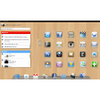Scan your Windows device for lost or hidden documents with this powerful search tool
Scan your Windows device for lost or hidden documents with this powerful search tool
Vote: (12 votes)
Program license: Free
Developer: Microsoft
Version: 4.0
Works under: Windows
Vote:
Program license
(12 votes)
Free
Developer
Version
Microsoft
4.0
Works under:
Windows
Pros
- Thorough integration with Microsoft products
- Dedicated floating search bar for constant access
- Searches across local and networked sources
Cons
- Local search speeds may fall behind competitors
- External drive search speed is noticeably slower
- Integration can feel too pervasive and unwieldy at times
A Comprehensive Solution for Integrated Windows Search
Microsoft Windows Desktop Search provides users with an expansive toolset designed to seek out numerous file types and communications across local system resources as well as networked drives. The platform’s intent to deliver a unified search experience is palpable, aiming to make digging through emails, calendar entries, documents, and a variety of other data much less of a chore.
Seamless Integration with Windows Environment
Upon installation, Microsoft's hallmark is evident in the pervasive spread of search functionality across its ecosystem. There’s a clear emphasis on integration with Windows components, demonstrated by the immediate presence of search boxes in systems such as Internet Explorer, the taskbar, within the Outlook client, and more. The addition of a floating search bar is also notable, providing persistent, on-hand search capabilities directly from the desktop.
Performance and Search Efficiency
The speed of local system searches with Windows Desktop Search may not rival some standalone desktop search applications but holds its own reasonably well. Its true proficiency, however, is most noticeable when interacting with Microsoft’s own products like Outlook, where finding appointments is straightforward and effective. Conversely, when it comes to scouring external drives, patience is required as the process is observably slower and less nimble than perhaps expected.
User Experience and Room for Growth
The tool does not fall short in terms of availability and ease of access; however, this omnipresence occasionally borders on invasive. The requirement to reboot after installation is a classic footprint of Microsoft's approach and hints at a potential for streamlining and modernization.
One could argue that the Windows Desktop Search accommodates the essential needs of users entrenched in the Microsoft ecosystem, yet it is sensed that the tool has yet to reach the pinnacle of what it could offer - with aspects like search speed and efficiency on non-local drives deserving further enhancement.
Conclusion
Microsoft Windows Desktop Search presents itself as a functional, integrated solution for users who manage a substantial amount of data on and off their personal computers. Primarily if invested in Microsoft's suite of products, it has the capability to boost productivity by reducing the time spent looking for items across a broad spectrum of locations.
Despite its utility, experienced users might find themselves yearning for quicker search responses and a more refined user experience overall. As it stands, Microsoft Windows Desktop Search forms a robust foundation, albeit with considerations for improvement that could elevate it from a mere utility to an indispensable search companion for Windows users.
Pros
- Thorough integration with Microsoft products
- Dedicated floating search bar for constant access
- Searches across local and networked sources
Cons
- Local search speeds may fall behind competitors
- External drive search speed is noticeably slower
- Integration can feel too pervasive and unwieldy at times




